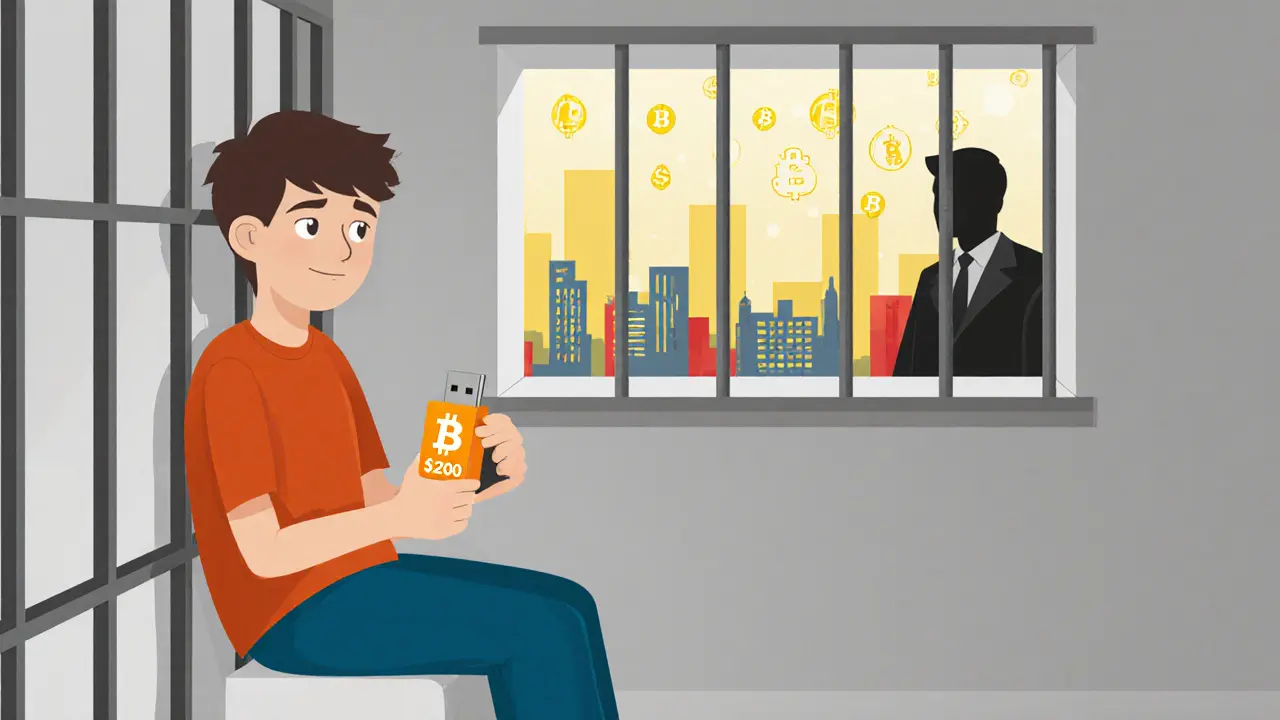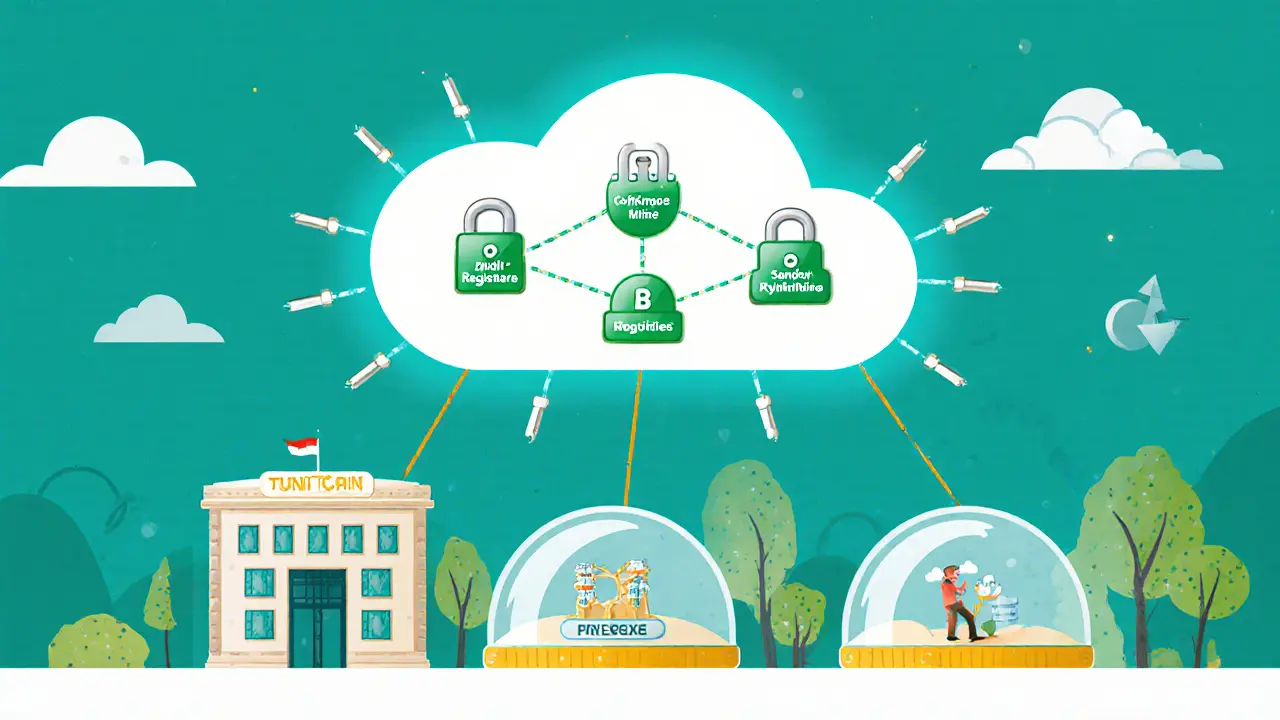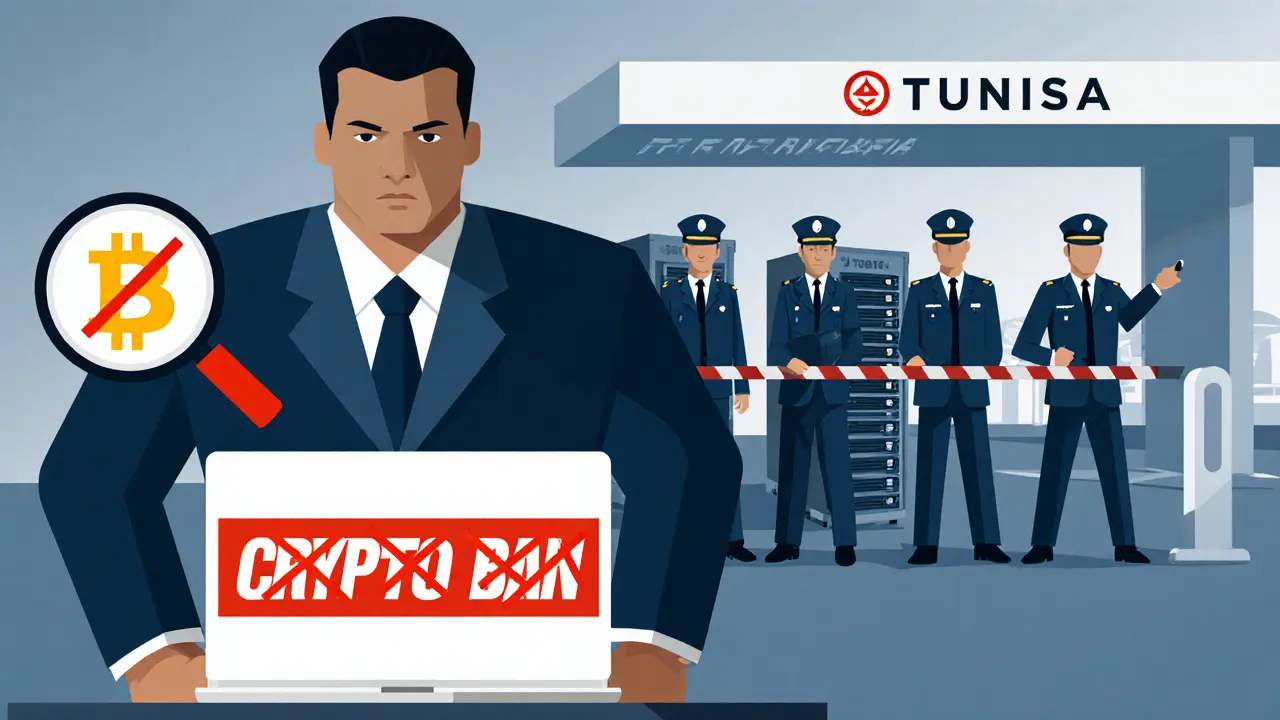Since May 2018, the Central Bank of Tunisia has enforced one of the strictest cryptocurrency policies in the world. No buying, selling, mining, or trading Bitcoin or any other digital asset is legal inside Tunisia. It’s not just discouraged-it’s against the law. And the penalties aren’t light: up to five years in prison and heavy fines if you’re caught running a crypto exchange, promoting tokens, or even holding significant amounts of cryptocurrency.
Why such a hard line? The main concern has always been capital flight. In the years before the ban, Tunisians were using peer-to-peer chat rooms to trade Bitcoin, often sending money out of the country to buy crypto on foreign exchanges. The Central Bank feared this was draining Tunisia’s foreign currency reserves, making it harder to pay for imports like fuel, medicine, and food. Banks were ordered to block card payments to international crypto platforms, and customs started seizing ASIC mining rigs at airports and borders.
What’s Actually Illegal Under Tunisia’s Crypto Rules
The ban covers everything. If you’re in Tunisia, you can’t:
- Use Bitcoin or Ethereum to pay for goods or services at any local business
- Buy crypto using a Tunisian bank account or local payment method
- Set up a crypto exchange or wallet service inside the country
- Import mining hardware like ASIC miners
- Convert mined cryptocurrency into Tunisian dinars
- Market or advertise any cryptocurrency product to Tunisian residents
Even if you’re just holding crypto in a wallet you created overseas, you’re technically in violation if you’re physically in Tunisia. The law doesn’t distinguish between personal use and commercial activity-it bans the entire ecosystem. That’s why e-commerce sites that tried listing prices in Bitcoin quickly shut down or moved their operations to Morocco or Turkey.
Who Enforces the Ban?
The Central Bank of Tunisia (BCT) is the main enforcer, but it doesn’t act alone. The Ministry of ICT & Digital Economy helps monitor digital activity, while the Financial Market Council (CMF) stands ready to regulate tokenized securities-if the ban ever lifts. Customs officials check luggage and cargo for mining equipment. Banks are legally required to flag any transaction linked to crypto exchanges. And telecom providers have been asked to assist in tracking peer-to-peer trading networks.
The legal basis for the ban comes from Tunisia’s currency control laws, originally designed to prevent illegal foreign exchange. In 2018, the BCT simply classified cryptocurrencies as unlicensed virtual money under those same rules. That gave them the power to treat crypto transactions like smuggling foreign cash.
The Teenager Who Went to Jail
In 2021, a 17-year-old student in Sfax was arrested after exchanging $200 worth of Bitcoin for Tunisian dinars through a local contact. He didn’t run an exchange. He didn’t profit. He just helped a friend convert crypto to cash. Still, he was sentenced to six months in prison. The case sparked national debate. People asked: Is locking up a teenager for trading $200 in crypto really protecting the economy? The government responded with silence. No policy changed. But the incident revealed a crack in the system-people were still using crypto, even if it meant risking jail.

Blockchain Is Fine. Crypto Is Not.
Here’s the twist: Tunisia doesn’t hate blockchain technology. In fact, it’s actively using it.
The Digital Tunisia 2025 project, the government’s roadmap for modernizing public services, explicitly names blockchain as a tool for improving transparency in land registries, subsidy distribution, and supply chain tracking. But there’s a catch: only permissioned blockchains are allowed. That means the government controls who can join the network, what data gets recorded, and how it’s used. Private companies can’t run public chains. Citizens can’t interact with open ledgers.
Since 2020, the BCT has run a regulatory sandbox-essentially a legal lab-for fintech startups to test blockchain applications under close supervision. Companies like VFunder (for creative crowdfunding), Hydro E-Blocks (tracking carbon credits), and No Phobos (AI-generated NFTs) have participated. But here’s the key: they all host their servers outside Tunisia. They use the sandbox to get research approval, not to offer services to the public. The sandbox isn’t a backdoor to crypto-it’s a way to experiment with blockchain without touching the ban.
Why the Ban Still Stands in 2025
Despite global trends-PayPal accepting crypto, El Salvador making Bitcoin legal tender, and even Nigeria allowing regulated exchanges-Tunisia hasn’t budged. Why?
First, the economy is fragile. Tunisia’s foreign reserves are low. The government relies heavily on domestic borrowing, which puts pressure on the central bank. If people could easily move money out of the country via crypto, it could trigger a currency crisis.
Second, the BCT fears losing control over monetary policy. If crypto became widely used, people might stop using the Tunisian dinar altogether. That would make it harder to manage inflation, interest rates, and credit.
Third, there’s no clear path to regulation. Unlike the UAE or Singapore, Tunisia doesn’t have a mature financial infrastructure to supervise crypto exchanges. Creating one would take years-and money the country doesn’t have.
So instead of opening up, the government doubled down on control. The sandbox keeps innovation alive without risking the currency. The ban stays. Enforcement stays. And the prison sentences? Still on the books.

What Happens If You Try to Use Crypto in Tunisia Today?
If you’re a tourist and you buy Bitcoin on Binance while visiting, you won’t get arrested. No one is checking your phone. But if you try to withdraw cash from a local exchange, or set up a crypto payment system for your business, you’re playing with fire. Banks monitor transactions. Customs scans packages. The law doesn’t care if you’re a tourist or a local-if you violate it, you’re liable.
For Tunisians living abroad, the rules are different. If you’re in France or Canada and you hold crypto, Tunisia has no jurisdiction. But if you return home and try to bring in mining gear or transfer crypto to a local wallet, you risk legal trouble.
The Future: Will Tunisia Ever Legalize Crypto?
Right now, no official plan exists to lift the ban. But the sandbox suggests the door isn’t completely closed. If the government sees that blockchain can improve public services without threatening the dinar, they might eventually allow regulated crypto under strict conditions-like requiring KYC, limiting transaction sizes, and tying all activity to the central bank’s oversight.
But don’t expect it soon. The economic pressures haven’t eased. The fear of capital flight hasn’t disappeared. And until Tunisia’s financial system is stable enough to handle decentralized money, the ban will stay.
The real story here isn’t about crypto. It’s about control. Tunisia chose to protect its currency over embracing innovation. Whether that’s smart or outdated depends on who you ask. But one thing’s clear: in Tunisia, crypto isn’t just unregulated-it’s forbidden.



